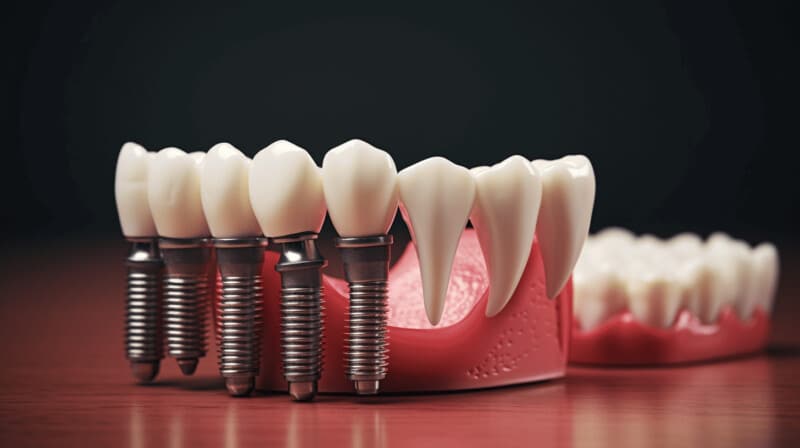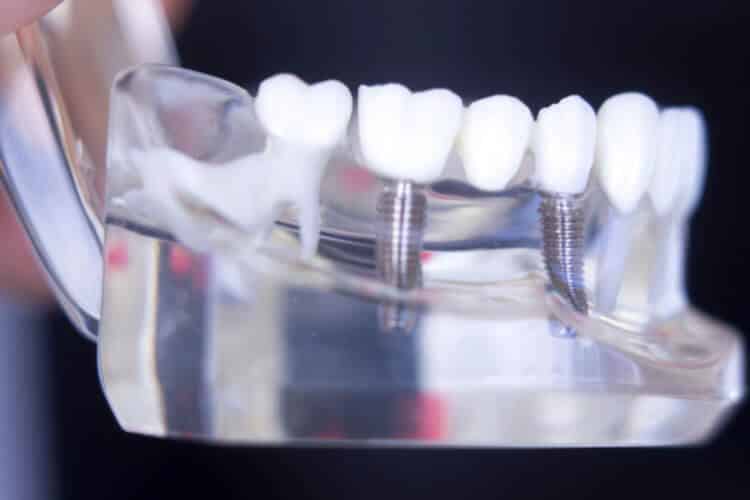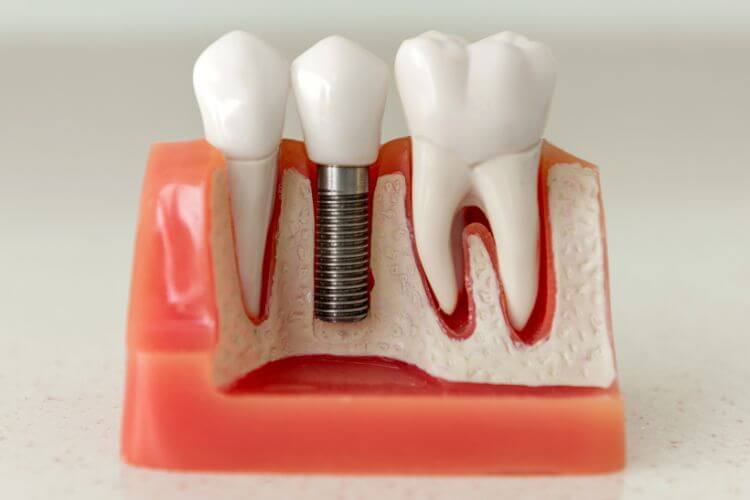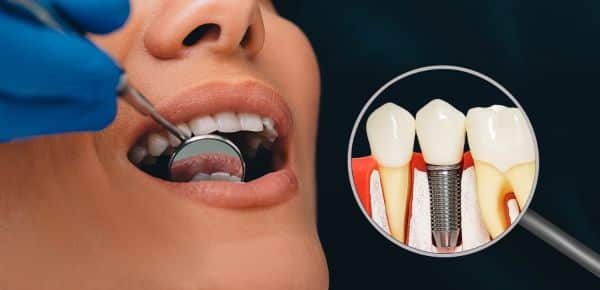Welcome, dear readers!
Today, we’re eager to delve deep into the devoted realm of dental health, specifically exploring Dentures versus Dental Implants. 🦷
It’s a topic that crosses our path quite frequently, and with good reason! From enhancing your radiant smile to improving your overall dental health, choosing between dentures and dental implants can really become a hurdle.
Navigating this journey can seem a little daunting initially. How much do they each cost? What about the maintenance? Are dental implants more durable? How will they affect my overall oral health?
We totally get it – and we’re here to help! By the end of this article, we aim to provide you with all the answers you need, helping you make an informed decision that suits your individual needs and preferences.
So, fasten your seatbelts as we journey into the fascinating world of dentures and dental implants, unveiling the facts, dispelling the myths and highlighting the pros and cons of each option.
Remember, the choice between dentures and dental implants isn’t a competition; rather, it’s about understanding which option will help bring back that confident, contagious smile of yours! 😊
Let’s get started, shall we?
Table of Contents
What Are Dentures?
“Your smile is your logo,” as they say, and when that smile becomes incomplete due to tooth loss, it can impact your confidence. Luckily, dental innovations like dentures can help restore that missing sparkle in your smile. But what exactly are dentures? Dentures are custom-made replacements for missing teeth and can be taken out and put back into your mouth. They’re not only designed to enhance looks but also to make eating and speaking a breeze again.
Cost and Maintenance
Now, before you wonder whether it’s wise to invest your hard-earned money in dentures, let’s shed some light on the cost and maintenance involved. Generally, dentures are economically frugal! On average, they cost around $2000. Notably, they are a viable option for those who have suffered from bone and gum loss.
But dentures do require maintenance. Just like natural teeth, they also need daily cleaning to remove food particles and plaque. Depending on their type, you might need to soak them overnight in a cleansing solution. Visit your dental health provider periodically to ensure your dentures are well-maintained. Also, remember that over time, they might need replacement due to common wear and tear.
- Our daily advice: Keep them clean and get regular check-ups.
- Our cost-cutting tip: Buy a denture care kit for at-home maintenance, save on undue expenses.
Drawbacks
Despite their plethora of advantages, dentures do come with a few drawbacks. They might feel a bit odd at first as your mouth takes time to adjust to them. Furthermore, they won’t necessarily prevent jawbone deterioration or offer the same stability that natural teeth do.
It’s much like a pair of new shoes. At first, they might feel uncomfortable, but eventually, you get used to them.
Bear in mind, smart decision-making is always based on weighing up the pros and cons. By giving you the complete picture regarding dentures, we hope we’ve equipped you with all the information you need to decide what’s right for your oral health. Remember, every smile is unique. Be sure your treatment choice reflects this. 👍🔖🦷
What Are Dental Implants?
When we lose a tooth, it can significantly affect our confidence and our ability to chew food. While there are several solutions for tooth loss, dental implants stand out as a remarkable and groundbreaking option. Designed to replace both the root of your tooth and the tooth itself, dental implants can truly change your smile and life.
Cost and Longevity – Dental Implants Vs Dentures
You may be wondering, “Are dental implants expensive?” The answer doesn’t come in black and white. While they may indeed demand a hefty upfront cost, dental implants can certainly offer long-term cost effectiveness. Why, you might ask? Well, though alternatives like bridges or dentures may initially seem less pricey, they often come with hidden costs. Over time, they need to be replaced, which can add up. On the other hand, dental implants are robust and can last a lifetime if taken care of properly.
Benefits
Unlike other dental solutions, dental implants provide more than just an aesthetic fix. They offer numerous benefits that can positively affect your oral health. For instance, they prevent further bone loss that could occur due to a missing tooth.
Dental implants also allow for superior stability, providing a strong base that won’t shift or move, making eating and talking much easier. You won’t have to worry about your implants falling out or slipping while you’re engaged in a passionate conversation or enjoying your favorite meal.
And that’s not all! They also boost your oral health. With implants, you can expect improved masticatory function (that’s a fancy way of saying “chewing ability”), which can significantly elevate your overall oral health-related quality of life.
Success Rate – Dental Implants Vs Dentures
If you’re concerned about the success rate of the dental implant procedure, worry no more! Dental implants have a high success rate of 95% to 98% in the initial years and a long-term success rate of over 90%. In other words, they are a reliable choice for most people.
And here’s a bit of relief — Dental implants do not lead to a higher risk of gum disease or root problems, making them a safe and healthy choice for oral care.
Ready to dive deeper into the world of dental implants? Take a look at our Guide to Dental Implants for a comprehensive overview of the procedure, benefits, and aftercare.
Comparison of Dentures and Dental Implants
The quest for a flawless smile has many of us pondering – dentures or dental implants? Weighing up the benefits and drawbacks of each option can be daunting, but never fear, because we’re here to break it down for you. Let’s dive into the nitty-gritty on the cost and maintenance, longevity and durability, oral health benefits, and aesthetic and functional considerations.
Cost and Maintenance
When it comes to your wallet, dentures are typically the less expensive option upfront. However, the maintenance of these replacements is certainly something to factor into your budget. Dentures may require periodic adjustments, relining or replacement, which means more visits to the dentist. On the other hand, dental implants, while certainly pricier, are often described as a better long-term investment. They require very little maintenance beyond your regular oral hygiene routine.
Longevity and Durability – Dental Implants Vs Dentures
As we’re on the topic of long-term consequences, let’s talk about durability. Dental implants are essentially lifetime companions, with their lifespan reaching up to 25 years or more. They’re designed to be sturdy and withstand day-to-day use – just like natural teeth. Dentures, while typically lasting anywhere between 5 to 7 years, can be susceptible to wear and tear – requiring more frequent replacements.
Oral Health Benefits – Dental Implants Vs Dentures
It’s not just about price and longevity though. When it comes to your health, dental implants take the crown (pun intended). Why, you ask? Dental implants provide significant health benefits like preserving the jawbone and preventing bone loss – something that’s unfortunately a usual side-effect when using dentures.
Aesthetic and Functional Considerations
Last but definitely not least, we have aesthetics and function. If these are your top priorities, then dental implants are a no-brainer. They’re experts at mimicking the look of natural teeth. They also function like our own pearly whites, allowing you to eat, speak, and smile without hindrance. People often feel more confident with dental implants too because they avoid that “slipping” sound or feeling that can sometimes occur with dentures.
When it comes to choosing between dentures and dental implants, your personal needs and circumstances matter the most. We’ve shed some light on these two popular options, and the ball is in your court. Ultimately, it’s all about finding what gives you a healthy and vibrant smile to last a lifetime.
Factors to Consider When Making a Decision
Making decisions is an inevitable part of life. Whether personal or professional, choices made at the crossroads of life can create lasting impacts. But what factors should we take into account when reaching these decisive moments? Today, we’re examining the main considerations that should influence your decision-making, namely: patient health, long-term needs, and cost considerations. So strap on your thinking caps, and let’s dive into detail! 🎯
Patient Health 🍎
If the decision you’re making pertains to health or medical conditions – be it for yourself or someone under your care – patient health should be your number one priority. Several elements play into this:
- Symptoms Severity: How intense are the symptoms? Do they significantly impact the patient’s daily life? It’s crucial to evaluate the severity of the illness when deciding on a treatment route.
- Medical History: Has the patient had similar health issues before? What treatments were attempted, and how effective were they? The patient’s medical history can significantly inform the decision-making process.
- Current Medical Conditions: Are there any ongoing illnesses or conditions that might complicate treatment options? Simultaneous health issues need to be considered to avoid conflicts or adverse reactions.
Long-term Needs 📆
Permanence is a significant factor to weigh in when making a decision. What might seem like a quick fix now may not be beneficial in the long run.
- Future Implications: How will the decision made now impact the person, business, or situation in six months? In a year? It’s important to think beyond the immediate.
- Flexibility: Is the resolution decided upon rigid, or does it allow for adjustments and changes as circumstances evolve?
- Sustainability: Can the outcome of the decision be maintained in the long run? In terms of health, can the patient cope with and maintain the recommended treatment? Financially, is the choice economically sustainable?
Cost Considerations 💸
Finally, the old adage stands true: nothing in life comes free. When making a decision, both the financial and non-financial costs need to be contemplated.
- Financial Impact: What is the monetary cost of your decision? Will it strain resources in the long run?
- Emotional and Physical Costs: Will this decision significantly impact mental or physical well-being? It’s critical to consider the emotional and physically draining aspects of any choice made.
- Opportunity Costs: By choosing one path, are we disregarding another potentially beneficial opportunity?
Our decisions shape our lives and those around us, both in the present and future. By considering the health of the individual involved, long-term implications, and associated costs, we can ensure more sound, responsible, and compassionate decisions. Have you weighed these elements in your most recent pivotal decision? 🤔
New Developments in Dental Implants Technology
In the world of dentistry, the continual unfoldment of innovative solutions is something to smile about, really. And trust us when we say, the future of dental implants is pretty exciting. With breakthrough developments, you won’t just regain a full set of chompers but enjoy an improved oral health experience to boot. Focusing on two of the most remarkable strides: the All-on-4 dental implants, and the implant-supported crowns, let’s plunge into the teeth-titillating world of cutting-edge dental implants technology.
All-on-4 Dental Implants – Dental Implants Vs Dentures
All-on-4 dental implants are rapidly becoming the go-to solution for patients looking for a complete smile without breaking the bank or undergoing an invasive surgery. So, what makes All-on-4 implants the talk of the town? Here are a few stellar perks:
- Less Invasive: Unlike traditional methods that can require bone grafts and several surgeries, All-on-4 implants involve fewer procedures. Keeping a tap on your well-being!
- Cost-effective: Seeing those long bills can make anyone clench their teeth. But hold on, All-on-4 implants are an economical choice, offering a full-mouth restoration at a fraction of the cost. No more grinding your financial worries away!
- Innovation at Its Finest: By capitalizing on available bone and placing four implants at precise angles, All-on-4 requires less artificial bone. A showcase of commendable strides in dental ingenuity!
Implant-Supported Crowns
Implant-supported crowns, on the other hand, are leading the way in single-tooth replacements. Need a reason to choose them? Here are some benefits to consider:
- Long-Lasting Solution: Implant-supported crowns boast an impressive 95% success rate, remaining functionally and aesthetically intact for over 20 years.
- Natural Appearance: Known for their impeccable resemblance to natural teeth, implant-supported crowns give a feel and appearance that’s almost identical to real teeth.
- Bone Preservation: Unlike traditional bridges, they prevent bone loss by stimulating the jawbone, promoting long-term oral health.
In a nutshell, these are just a glimpse into the evolving world of dental implant technology. The advancements poised for 2023 are set to take the industry by storm. From improving patient experience to enhancing surgical techniques, it’s all lined up. If you’re curious to explore more about the future, hop over to our article on the Advancements of Dental Implants heading our way.
Dental implants technology is continuously evolving, and it’s thrilling to see what tomorrow holds for us and our teeth. So let’s keep those smiles bright. After all, every smile tells a story; shouldn’t yours tell one of innovation and state-of-the-art dental care! So, are you ready to take the bite?
Conclusion – Dental Implants Vs Dentures
After walking through the significant differences and pros and cons of both dentures and dental implants, it’s clear that the choice heavily depends on your specific needs, health condition, and budget. Both deliver unique strengths, and understanding their differences is critical when it comes to making an informed decision.
At Wilshire Smile Studio, we are committed to helping you make an informed decision that works best for your oral health, lifestyle, and budget. Our team of dedicated professionals will guide you through every step of the process, providing the information you need to ensure you’re making the right choice. With the latest technology and personalized care, we make each dental treatment a smooth and comfortable experience.
Choosing between dentures and dental implants doesn’t need to be an overwhelming decision. With the right information and professional advice, you can select a solution that allows you to eat, laugh, and smile with confidence. Feel free to connect with us to get started on your journey to achieving a healthy, beautiful smile. Remember, your smile, comfort, and health are our top priorities.
Book your free consultation with us online or call (323) DENTIST (323-336-8478) today.
Frequently Asked Questions
1. What are the main differences between dental implants and dentures?
The main differences between dental implants and dentures are: Dental implants are permanent and surgically implanted into the jawbone, while dentures are removable and rest on top of the gums. Implants look and function like natural teeth, while dentures may have some limitations in terms of chewing and speech. Implants require a surgical procedure, while dentures do not.
2. Which option is better: dental implants or dentures?
The choice between dental implants and dentures depends on various factors including oral health, bone density, budget, and personal preferences. Dental implants are considered a more long-term and natural-looking solution, but they are also more expensive. Dentures, on the other hand, are more affordable and suitable for individuals with poor oral health or limited bone density.
Dental Implants Vs Dentures
3. How long do dental implants last?
With proper care and maintenance, dental implants can last a lifetime. The implant itself is made of a biocompatible material like titanium, which integrates with the jawbone. However, the lifespan of dental implants can vary depending on factors such as oral hygiene, overall health, and lifestyle habits.
4. Are dental implants painful?
Dental implant surgery is typically performed under local anesthesia, so you should not feel any pain during the procedure. However, some discomfort and swelling may occur during the recovery period. Your dentist may prescribe pain medication or suggest over-the-counter pain relievers to manage any post-operative discomfort.
5. Can dentures be converted to dental implants?
In some cases, dentures can be converted to dental implants through a process called implant-supported dentures or overdentures. This involves placing dental implants into the jawbone and attaching a custom-made denture to the implants. However, not all dentures are suitable for conversion, so it’s best to consult with a dental professional to determine the feasibility.









